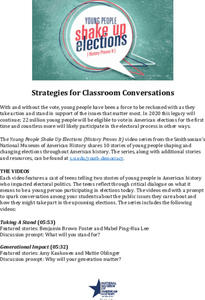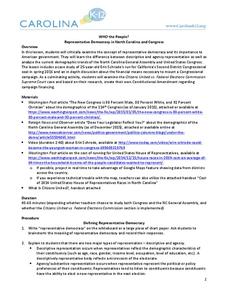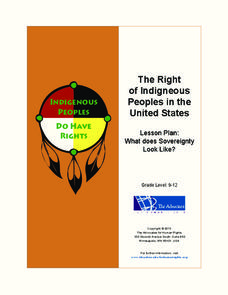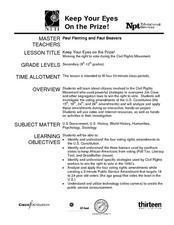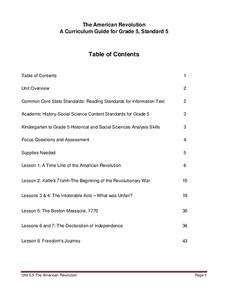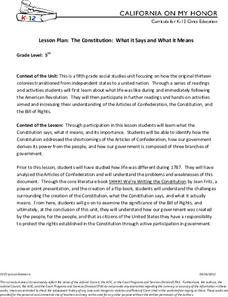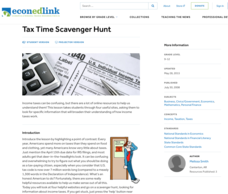Smithsonian Institution
Young People Shake Up Elections (History Proves It) Educator Guide
Vote, it's your civic duty! The resource provides several videos about voting in the United States. Scholars watch a series of topics ranging from youth participation to civic action. The educator's guide provides teachers with...
Carolina K-12
Who the People? Representative Democracy in North Carolina and Congress
Our elected officials are supposed to represent us, but what does it mean when they aren't like us? Budding citizens explore the demographic makeup of the US Congress, the role of money in political elections, and the Citizens United...
C-SPAN
The Impact of Citizens United v. FEC
What began as an effort to show a movie by an interest group has impacted financing of federal elections. Did the Citizens United case lead to more "dark money" in politics, or did it shine a light with more speech? Using video clips...
University of Arkansas
Human Rights
What basic rights are guaranteed to all Americans? Do citizens, legal aliens, illegal aliens, and minors all have the same rights? Should individuals all over the world enjoy the same rights? Class members read the Declaration of...
Center for Civic Education
Becoming a Voter
What are the requirements to register to vote in the United States? Young citizens evaluate this process by working with handouts, informational texts, discussion, and research, as well as complete a sample voter registration form.
Federal Reserve Bank
The Story of the Federal Reserve: High School Lesson Plan
Is there a bank for the banks? Pupils analyze the complexities of the Federal Reserve system by breaking it down into easy-to-understand sections. Step-by-step investigation using flow charts and graphs of how the monetary system works...
Facing History and Ourselves
Free Press Makes Democracy Work
A unit study of the importance of a free press in a democracy begins with class members listening to a podcast featuring two journalists, one from a United States public radio station and one from Capetown, South Africa. The lesson,...
Advocates for Human Rights
The Right of Indigneous Peoples in the United States
The sovereignty of U.S. Native American nations is the focus of a resource that asks class members to compare the Right to Self-Determination in the UN Declaration on the Rights of Indigenous Peoples with a fact sheet that details the...
Curated OER
Keep Your Eye On the Prize
High schoolers learn about citizens who were actively involved in the civil rights movement, and the strategies they used to overcome the Jim Crow laws that were so prevalent in the 1960s. They investigate the voting amendments of the US...
California State University
The American Revolution
Invite your class on a ride through the American Revolution. Young historians travel through time as they explore the events that led to the foundation of the United States of America. Over the course of eight lessons, this unit provides...
Curated OER
Jimmy Carter: Civic Action, Lesson 2
Build on high schoolers' awareness of what's wrong with society. Here they examine Jimmy Carter's extensive involvement in volunteer action in the local, national, and global arenas. Define and explore concepts -- philanthropy, citizen,...
Judicial Branch of California
The Constitution: What It Says and What It Means
Learners get the chance to act as representatives to the Constitution Convention, and must decide whether or not to recommend your state ratify the new framework. After examining the Constitution line-by-line, they consider their...
K20 LEARN
Bill of Rights: Do I Have a Right?
Aliens have taken over the United States! Citizens can only keep two rights laid out in the first 10 amendments of the Constitution and must figure out which ones are best. Young scholars research the importance of each amendment and key...
Friends of Fort McHenry
Baltimore – Caught in the Middle
Choosing sides is no easy matter, and this was certainly true for the citizens of Baltimore in the beginning stages of the Civil War. Using video, group analysis of several primary sources, and discussion, this detailed and thorough...
Curated OER
A River Ran Wild: An Environmental History
The Nashua River serves as the focal point of an investigation of the treatment of and care for natural resources. A reading of A River Rand Wild: An Environmental History by Lynne Cherry, launches the study and class members consider...
City University of New York
Jim Crow and the Fight for Civil Rights
The history of voting rights in America has always been rocky, especially in the time period after the Civil War. Learn about the ways that Jim Crow laws affected the voting rights of African Americans with a lesson featuring primary...
Annenberg Foundation
Global America
It's not really a small world after all! The 21st lesson of a 22-part series on American history researches the impact of globalization on the United States. Using photographic and written references materials, as well as video sources,...
United Nations
The UN: Working for Us All
The United Nation's role in world diplomacy is critical, but its enforcement is limited. Using activities such as role plays and simulations, classmates consider the role the UN plays in world peace keeping. The unit plan includes five...
Core Knowledge Foundation
Immigration Tell It Again!™ Read-Aloud Anthology
The read-aloud unit focuses on immigration. Scholars hear stories about people's sacrifices and their journey to and experience in another country. Pupils discuss readings, practice vocabulary skills and participate in extension...
Center for History and New Media
Slavery and Free Negroes, 1800 to 1860
What was life like for enslaved and free black people before the American Civil War? Explore the building tension between states and the freedom of individuals with a thorough social studies lesson. Learners of all ages explore primary...
University of Arkansas
Promises Denied
"Promises Denied," the second instructional activity in a unit that asks learners to consider the responsibilities individuals have to uphold human rights, looks at documents that illustrate the difficulty the US has had trying to live...
Council for Economic Education
Tax Time Scavenger Hunt
Is a 1040EZ tax form really easy? Scholars investigate the complexities of the United States taxation system with an economics lesson. Using a wide variety of web sources, they interpret IRS taxation rules and regulations to better...
Delegation of the European Union to the United States
Cultural Identity
How does cultural diversity impact political identity? That is the question researchers face as they continue their examination of the European Union and the programs it has developed in its attempt to achieve unity in diversity. To gain...
National Endowment for the Humanities
David Walker vs. John Day: Two Nineteenth-Century Free Black Men
What was the most beneficial policy for nineteenth-century African Americans: to stay in the United States and work for freedom, or to immigrate to a new place and build a society elsewhere? Your young historians will construct an...


